2017牛津译林版初中英语八年级英语下Unit3 Online tours学案(5份)有答案
Unit3Onlinetours知识讲义牛津译林版八年级英语下册

牛津版译林英语8B知识点总结Unit3 Online tours【Wele to the unit】1. I agree.【知识点一】:agree v.同意①同意某人的意见agree with + 人②就某事达成一致意见agree on + 事情③同意做某事agree to do sth.④同意… agree + 宾语从句(1) 反义词disagree(2) 名词agreement2. send and receive emails【知识点一】:send v. 发送;寄出(sent/sent)寄给某人某物send sb sth = send sth to sb【知识点二】:receive v.收到,接到从某人哪里收到某物receive sth. from sb.区分:receive 客观收到accept主观接受Eg. The man received a letter just now.My aunt gave me a book and I accepted it happily.(1) I __________ a new bike on my birthday, but I didn't ___________ it.A. received; receiveB. accepted; receiveC. received; acceptD. accepted; accept(2) I haven't __________ my penfriend's letter for two weeks.Maybe he is too busy recently.A. acceptedB. receivedC. writtenD. collected(3) Nowadays _____________(接收) emails is faster and _____________(简单) than before.3. —What do you usually use your puter for?—I usually use it to search for information.【知识点一】: use sth. to do sth. 使用某物做某事= use sth. for doing sth.【知识点二】: search /sɜːtʃ/(1)v. 搜寻,搜索①search sp. 搜寻某地搜寻房间search the room②search sp. for... 在某地搜寻某物Eg. They are searching the forest for the missing boy.③search sb. for sth. 搜查;搜身Eg. The police searched the thief for the lost money.④search for sth. / sb. 寻找某物/ 某人=look / hunt / seek for(2) n.搜寻,搜索in search of... 为了寻找...Eg. She went into the kitchen in search of something to drink.(1) — Why did Mike _____ the room?— I’m not sure. Maybe he wanted to ____ his watchA. search; findB. search for; findC. search; lookD. search for; look for(2) It took the parents the whole day ___________ the town ___________ the lost baby.A. searching; forB. to look; forC. to search; forD. finding; out(3) — Would you please show me your new puter?— Sorry, my brother __________ (search) for something on it.【知识点三】: information /ˌɪnfəˈmeɪʃn/ un. 信息①一条信息a piece of information②信息时代information age(1) v. inform 通知①inform sb. of sth. 通知某人某事Eg. The boss informed us of his arrival.4. —How often do you use your puter for this? —Almost every day.【知识点一】:how often(1) how often 表多久一次,问频率Eg. How often does your brother exercise? Twice a week.(2) how long 表示多长时间,对一段时间进行提问Eg. How long did you stay there? A bout three weeks.(3) how soon 表示多久,对将来的时间进行提问Eg. How soon will he be back?In a week.(1)_____________ do you write to your pen friend?Twice a month.A. How oftenB. How soonC. How longD. How many times(2)___________ do you water the plants? Twice a day.A. How longB. How soonC. How oftenD. How much【知识点二】:almost adv. 几乎,差不多辨析almost 和nearly(1) almost:在程度上比nearly更强可与any、nobody、never、nothing、none等否定词连用(2) nearly:常用在具体数字前面不可与any、nobody、never、nothing、none等否定词连用可与not构成短语not nearly—远远不如:Nearly everyone knows him.=Almost everyone knows him.【Reading】1 I’m your tour guide.【知识点一】:guide /ɡaɪd/(1) cn. 导游,向导①一位导游a tour guide②导盲犬guide dog(2) n. 指南,手册a Guide to Family Health(3) v. 领路;指引带领某人到/穿过guide sb. to/ throughEg. She guided us through the busy streets to the park.2. Have you noticed the “Tour” icon at the top of the page? Just click on it, and you can visit Asia, Africa, Europe, America and more in only eight hours!【知识点一】:notice(1) v. 注意;注意到①注意到某人/某事notice sb/sth②注意到某人做某事notice sb do (强调动作发生的全过程或经常发生)notice sb doing sth. (强调动作正在发生)③notice + 从句(2) un. 注意注意到… take notice ofEg. Don't take any notice of what you read in the papers.(3) cn. 通知,布告,公告牌Eg. There is a notice on the office door saying “No Smoking”.(1) Have you noticed a tall boy __________ a basketball ____________ into the building?A. has; runB. have; runningC. with; runD. with; running(2) When I passed the river, I saw some children ________________ (play) on the sand.【知识点二】:at the top of 在……顶端反义短语:at the bottom of 在……底部Eg. There stands a tall tree at the top of the mountain.【知识点三】:click vi. 点击单击某物click on sth.double left click on左键双击left click on左键单击3. Wall Street, the worldfamous trade center, is here at the southern end of Manhattan Island. There are many big panies and international banks here.【知识点一】:worldfamous /wɜ:ld ˈfeɪməs/(adj.) 世界著名的,举世闻名的①因为...而举世闻名be worldfamous for...This player was worldfamous for scoring the first goal of the 2010 World Cup.这位球员因打进了2010世界杯第一个球而举世成名。
译林牛津版八年级英语下册8B Unit 3 Online tours
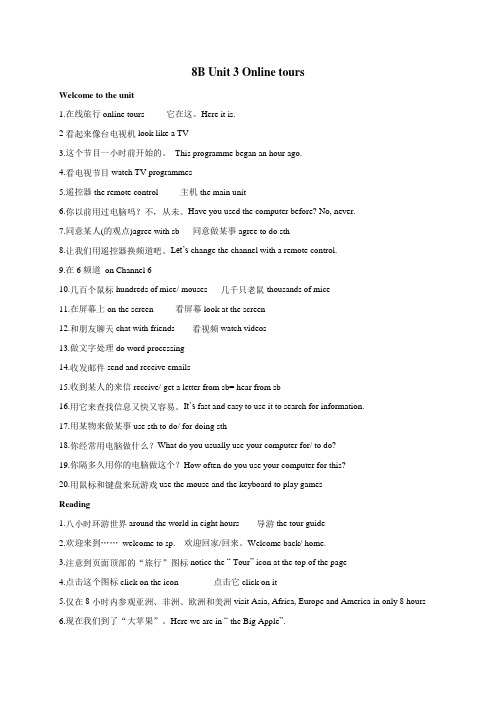
8B Unit 3 Online toursWelcome to the unit1.在线旅行online tours 它在这。
Here it is.2看起来像台电视机look like a TV3.这个节目一小时前开始的。
This programme began an hour ago.4.看电视节目watch TV programmes5.遥控器the remote control 主机the main unit6.你以前用过电脑吗?不,从未。
Have you used the computer before? No, never.7.同意某人(的观点)agree with sb 同意做某事agree to do sth8.让我们用遥控器换频道吧。
L et’s change the channel with a remote control.9.在6频道on Channel 610.几百个鼠标hundreds of mice/ mouses 几千只老鼠thousands of mice11.在屏幕上on the screen 看屏幕look at the screen12.和朋友聊天chat with friends 看视频watch videos13.做文字处理do word processing14.收发邮件send and receive emails15.收到某人的来信receive/ get a letter from sb= hear from sb16.用它来查找信息又快又容易。
I t’s fast and easy to use it to search for information.17.用某物来做某事use sth to do/ for doing sth18.你经常用电脑做什么?What do you usually use your computer for/ to do?19.你隔多久用你的电脑做这个?How often do you use your computer for this?20.用鼠标和键盘来玩游戏use the mouse and the keyboard to play gamesReading1.八小时环游世界around the world in eight hours 导游the tour guide2.欢迎来到……welcome to sp. 欢迎回家/回来。
牛津译林版八年级英语下册 Unit 3 Online tours Reading 1课件 3
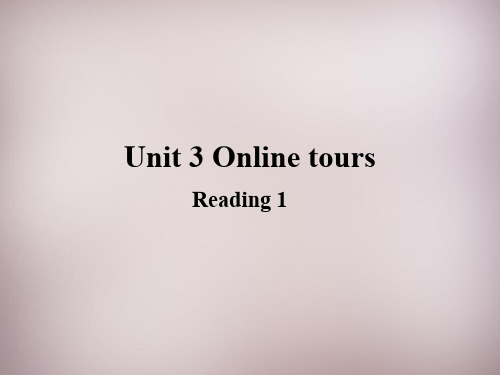
He is visiting New York.
(2).How is he visiting the city?
He is visiting the city by an online tour.
Guide One
2. Listen and find out the answers to the following questions
Homework
• 1. Read the article three times correctly. • plete the exercise of Reading I in
Exercise Period carefully.
• FFTFFFTT • help people travel to different places • at the bottom of the page • at the southern end of Manhattan Island • fall from the sky on New Year’s Eve • click on the “Back” icon • start a new online tour
travel information?
Guide One
1.Open your books and turn to page 36. Read the article quickly. Then tell me what city Daniel is visiting and how he’s visiting the city.(3′
• (1)Around the World in Eight Hours (2)online • (3).Asia (4).Europe (5).companies • (6).international banks (7).new year • (8).relax (9)twentieth century • the early twentieth century(20世纪早期)
牛津译林版八年级下册Unit3《Onlinetours》说课稿3

牛津译林版八年级下册Unit 3《Online tours》说课稿3一. 教材分析《Online tours》是牛津译林版八年级下册Unit 3的一篇课文,主要介绍了一种新兴的旅游方式——在线旅游。
通过网络摄像头,游客可以在家中欣赏到世界各地的美景。
本文旨在让学生了解在线旅游的发展和优势,以及如何利用网络资源进行旅游规划。
二. 学情分析八年级的学生已经具备了一定的网络素养和信息技术能力,对网络旅游有一定的了解。
但他们在实际应用中,可能会遇到词汇、语法和阅读理解等方面的困难。
因此,在教学过程中,需要关注学生的个体差异,引导他们主动参与课堂活动,提高他们的英语素养。
三. 说教学目标1.知识目标:让学生掌握课文中的关键词汇和语法结构,了解在线旅游的发展和优势。
2.能力目标:培养学生通过网络资源进行信息搜索和交流的能力,提高他们的阅读理解和写作能力。
3.情感目标:激发学生对旅游的兴趣,培养他们积极上网查阅资料的良好习惯。
四. 说教学重难点1.重点:课文的理解和词汇、语法的学习。
2.难点:如何利用网络资源进行旅游规划,提高实际应用能力。
五. 说教学方法与手段1.任务型教学法:通过设定具体任务,让学生在实践中学习英语,提高他们的实际应用能力。
2.情境教学法:创设真实的旅游情境,让学生在情境中学习英语,提高他们的口语表达能力。
3.信息技术辅助教学:利用网络资源,为学生提供丰富的学习材料,提高他们的自主学习能力。
六. 说教学过程1.导入:以一段关于在线旅游的视频导入,激发学生的兴趣。
2.阅读理解:学生自主阅读课文,回答相关问题,检测他们对课文内容的理解。
3.词汇学习:教师讲解课文中的关键词汇和语法结构,学生进行笔记。
4.实践环节:学生分组讨论,结合课文内容,设计一份在线旅游计划。
5.展示环节:各组学生展示他们的在线旅游计划,其他学生进行评价。
6.总结:教师对课堂内容进行总结,强调在线旅游的优势和注意事项。
七. 说板书设计板书设计主要包括课文标题、关键词汇、语法结构和课堂活动流程。
最新牛津译林初中八年级英语下册 Unit 3 Online tours教案
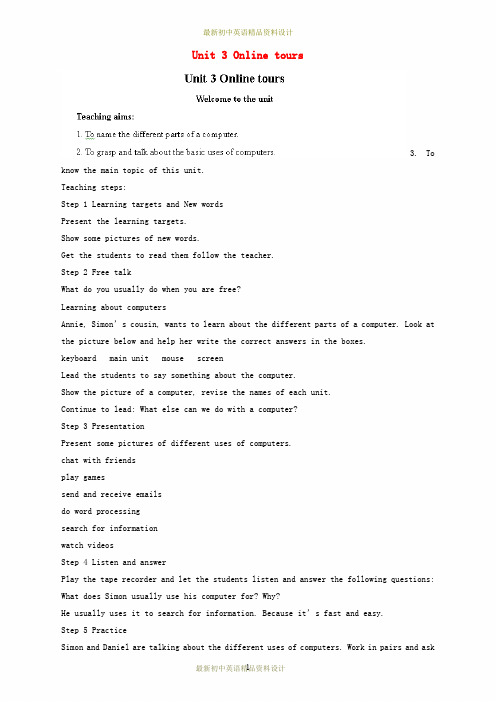
Unit 3 Online tours3. To know the main topic of this unit.Teaching steps:Step 1 Learning targets and New wordsPresent the learning targets.Show some pictures of new words.Get the students to read them follow the teacher.Step 2 Free talkWhat do you usually do when you are free?Learning about computersAnnie, Simon’s cousin, wants to learn about the different parts of a computer. Look at the picture below and help her write the correct answers in the boxes.keyboard main unit mouse screenLead the students to say something about the computer.Show the picture of a computer, revise the names of each unit.Continue to lead: What else can we do with a computer?Step 3 PresentationPresent some pictures of different uses of computers.chat with friendsplay gamessend and receive emailsdo word processingsearch for informationwatch videosStep 4 Listen and answerPlay the tape recorder and let the students listen and answer the following questions: What does Simon usually use his computer for? Why?He usually uses it to search for information. Because it’s fast and easy.Step 5 PracticeSimon and Daniel are talking about the different uses of computers. Work in pairs and askeach other what you use a computer for. The ideas in the box may help you. Use the conversation below as a model.chat with friends do word processingplay games search for informationsending and receive emails watch videosThe teacher act the dialogue with a student and then get the students to practice with their partners.A: What do you usually use your computer for?B: I usually use it to...A: Why?B: Because ...A: How often do you use your computer for this?B: ...Step 6 PresentationGet the students to talk about this question:Do Eddie and Hobo know well about computers?Step 7 Listen and answerListen to the recording and answer the questions:What do Eddie and Hobo think the computer look like?They think it looks like a TV.Do you know what "the remote control" really is?It is a mouse.Step 8 Read the dialogue and act it out!Give the students some time to practice the dialogue with their partners and then ask some groups to come to the blackboard to perform for the rest.Step 9 Homework1. Read the text book and learn the new words and phrases by heart.2. Do the exercises in the workbook.Reading ITeaching aims:1. To know some famous places in New York.2. To grasp the main idea of this article according to the key words and context.3. To grasp some basic skills of reading.Teaching steps:Step 1 RevisionFill in the blanks.1. Daniel keeps two white _____ (mouse) as pets.2. I ________ (receive) an email from my cousin two days ago.3. I ________ (see) this movie before.4. They used a knife ______ (open) the door.5. This old man can use a computer _____ (do) word processing.6. I don’t like watching football games. Let’s ______ (change) a channel.Answers: 1. mice 2. received 3. have seen 4. to open 5. to do 6. changeStep 2 Free talkDo you like travelling? Do you know these places?Present a world map, teach the words of Asia, Africa, Europe, etc.Step 3 New wordsTeach the new words.guide n.导游,向导 icon n. 图标 click v. 点击world-famous adj. 举世闻名的 trade n. 贸易 international adj. 国际的gather v. 聚集,集合 huge adj. 巨大的 darkness n. 黑暗island n. 岛屿 several det. 几个,数个 lawn n. 草坪relax v. 放松,休息 hard adj. 艰难的 musical n. 音乐剧bottom n. 底,底部Step 4 A fun way to travelDaniel does not know the meanings of some words on the web page. Help him match the words on the left with the meanings on the right. Write the correct letters in the blanks.1. trade2. international3. gather4. huge5. several6. relax7. century8. musicala. a play filled with many songsb. rest after workc. come togetherd. a period of 100 yearse. more than twof. the activity of buying and sellingg. two or more countries taking part in somethingh. very largeAnswers: f, g, c, h, e, b, d, aStep 5 SkimmingSkim the article and find the answer to the question:Where do we visit following the guide?How many places are mentioned(提到) in the article?Step 6 Intensive ReadingPart 1 Pre-travellingAnswer the questions:1. What's the guide's name?2. How can we start out tour?3. How long will it take us to travel around the world?4. Where are we going to visit?Answers: 1. Robin.2. Click on the "Tour" icon at the top of the page.3. In eight hours.4. New York, the biggest city in the USA.Part 2 While travelling1. What places of interest are mentioned in this article?2. Where is the Wall Street?3. What can we see in Wall Street? Why?4. What will happen in Times Square on New Year's Eve?5. What's in the park?6. What can people do in the Central Park?7. What is the Broadway famous for?8. How long has it been famous?9. Where does the famous song “Memory” come from?Answers: 1. Wall Street, Times Square, Central Park and Broadway.2. It is at the southern end of Manhattan Island.3. We can se many big companies and international banks. Because it is theworld-famous trade centre.4. Thousands of people gather there and they feel excited when they see the hugeglass ball falling through the darkness.5. Several lakes, hills and a large green lawn.6. Relax.7. It is famous for its theatres.8. Since the early twentieth century.9. It comes from the famous Broadway musical Cats.Part 3 Post travellingHow can we start out new tour?Step 7 ExercisesDo Section B2 and check the answers.Daniel is introducing the website to Millie. Millie is trying to find out what people can see in New York. Help her fill in the blanks.Finish Section B3 and check the answers.Amy is also interested in travelling around the world. She is telling her mum about the website. Check whatever she says is correct or not. Write a T if a sentence is true or an F if it is false.1. The website helps people buy tickets to different places.2. There is a “Tour” icon at the bottom of the page.3. New York is also called “the Big Apple”.4. Wall Street is at the northern end of Manhattan Island.5. A big apple falls from the sky on New Year’s Eve at Times Square.6. There are no hills or lakes in Central Park.7. The song “Memory” comes from the musical Cats.8. Click on the “Back” icon and you can start a new online tour. Complete Section B4 and check the answers.Kitty also wants to know the website. She is asking Daniel about it. Complete their conversation below.Kitty: Daniel, what's the website called?Daniel: It’s called “(1) _____________________________”.K: It gives people (2) _____ tours, right?D: Yes. It can show you cities in (3) ____, Africa, (4) ______, America and other places. K: Can we find more information about a city?D: Of course. Look, here’s New York, and here’s Wall Street.K: I see. Wall Street is on Manhattan Island. There are many big (5) _________ and (6) __________________ there.D: Yes, and Times Square is another great place to visit. Every year, many people gather there to welcome the (7) ______.K: That sounds great. Look! That’s Central Park. People like to (8) ____ there after work. D: Yes, and don’t miss Broadway. It has been famous for its theatres since the early (9) _______________.Step 8 Enjoy the beauty of New York.Homework1.Read aloud the article and underline the difficult parts.2. Remember the new words in this lesson.Reading IITeaching aims:1. To know some famous places in New York.2. To grasp the main idea of this article according to the key words and context.3. To grasp some basic skills of reading.Teaching steps:Step 1 RevisionAsk some questions of the article1. What places did we visit on the website in last lesson?Wall Street; Times Square; Central Park and Broadway.2. Where would you like to go after a day's work?Central Park3. What's Broadway famous for?It's famous for its theatres.Step 2 Language points1. Have you noticed the “Tour” icon at the top of the page?at the top of ... 在……的顶部e.g. 山上有座塔。
牛津译林版八年级英语下册《Unit 3 Online tours》(Study skills)课件
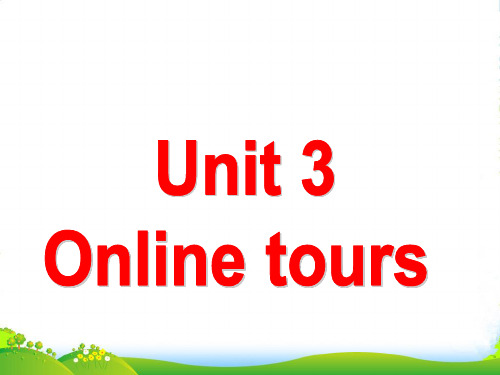
Wall Street Times Square Central Park Broadway
When we make charts, we do not need to use complete sentences.
1. 你介意为我们唱首歌吗? Do you mind singing a song for us?
2. 上海位于中国的东海岸。 Shanghai is on the east coast of China.
3. — 谢谢你的帮助。
4. 步行到学校要花费我半个小时。 It takes me half an hour to walk to school.
Байду номын сангаас
a an online course b asking the way c booking tickets and hotels d Daily English e ordering meals f seeing a doctor g shopping h using English in daily
相么
You made my day!
成读 的书
两,
件要
事么
。旅
。行
,
身
体
和
灵
魂
总
要
我们,还在路上……
Millie is making a chart to introduce an online course to her classmates. Help her use the chart to organize her ideas. Write the letters in the boxes.
牛津译林版八年级下册Unit 3《Online tours》说课稿9

牛津译林版八年级下册Unit 3《Online tours》说课稿9一. 教材分析《Online tours》是牛津译林版八年级下册Unit 3的一篇课文,主要介绍了一种新兴的旅游方式——在线旅游。
通过阅读课文,学生可以了解到在线旅游的特点、优势以及如何进行在线旅游。
本课的主题与学生的日常生活紧密相连,能够激发学生的学习兴趣。
二. 学情分析八年级的学生已经具备了一定的英语基础,对于日常生活中的事物和现象有一定的认知。
然而,他们在阅读长篇文章时可能会遇到困难,特别是对于一些专业术语和较长句子。
因此,在教学过程中,教师需要关注学生的个体差异,尽可能地调动学生的积极性,帮助他们克服学习困难。
三. 说教学目标1.知识目标:让学生掌握在线旅游的相关词汇和表达方式,如“virtualtour”、“interactive”等。
2.能力目标:培养学生具备快速获取信息、处理信息的能力,提高学生的阅读理解能力。
3.情感目标:引导学生正确看待新兴事物,培养学生的创新意识。
四. 说教学重难点1.重点:在线旅游的相关词汇和表达方式。
2.难点:理解课文中的长句子和复杂结构,以及如何运用所学知识进行实际应用。
五. 说教学方法与手段1.交际式教学法:通过小组讨论、角色扮演等形式,让学生在实际语境中运用所学知识。
2.任务型教学法:引导学生完成课后的实践任务,提高学生的实际操作能力。
3.多媒体教学手段:利用多媒体课件和网络资源,为学生提供丰富的学习资源,增强课堂教学的趣味性。
六. 说教学过程1.导入:以一个关于在线旅游的短动画引入课题,激发学生的兴趣。
2.阅读理解:让学生阅读课文,回答相关问题,提高学生的阅读理解能力。
3.词汇学习:引导学生学习课文中的新词汇,并通过实例进行讲解。
4.课堂讨论:分组让学生讨论在线旅游的优缺点,培养学生的批判性思维。
5.实践任务:让学生设计一个在线旅游方案,并进行展示,提高学生的实际操作能力。
6.总结:对本课内容进行总结,强调在线旅游的特点和优势。
牛津译林版八年级下册Unit 3《Online tours》教学设计8

牛津译林版八年级下册Unit 3《Online tours》教学设计8一. 教材分析《Online tours》是牛津译林版八年级下册Unit 3的一篇课文,主要介绍了一种新兴的学习方式——网上旅游。
通过阅读课文,学生可以了解网上旅游的优势以及如何在网上选择旅游目的地。
本课主要围绕“网上旅游”这一主题,通过引入真实、生动的例子,让学生更好地理解网上旅游的优点和乐趣。
二. 学情分析八年级的学生已经具备了一定的英语基础,对于日常生活中的一些现象和事物有了一定的认识。
然而,对于网上旅游这一新兴领域,他们可能还比较陌生。
因此,在教学过程中,教师需要引导学生了解网上旅游的基本概念,并通过实例让学生体验网上旅游的乐趣。
三. 教学目标1.知识目标:–学生能够掌握与网上旅游相关的词汇和表达方式。
–学生能够理解课文中关于网上旅游的描述和例子。
2.能力目标:–学生能够用英语简单介绍网上旅游的优势和如何进行网上旅游。
–学生能够在小组合作中运用所学知识,进行网上旅游的讨论和分享。
3.情感目标:–学生能够培养对网上旅游的兴趣,激发他们学习英语的积极性。
四. 教学重难点•学生能够掌握与网上旅游相关的词汇和表达方式。
•学生能够理解课文中关于网上旅游的描述和例子。
•学生能够用英语进行网上旅游的介绍和讨论。
五. 教学方法1.任务型教学法:通过设定具体的任务,让学生在完成任务的过程中运用所学知识,提高学生的实际应用能力。
2.合作学习:通过小组合作,让学生共同探讨和分享网上旅游的经验和心得,提高学生的团队合作能力。
3.情境教学法:创设真实的网上旅游情境,让学生在情境中感受和体验网上旅游的乐趣,提高学生的学习兴趣。
六. 教学准备1.教师准备:–熟悉教材内容,了解学生的学习情况。
–准备相关的教学资源和素材。
2.学生准备:–预习课文,了解网上旅游的基本概念。
–准备相关的学习资料和工具。
七. 教学过程1.导入(5分钟)–教师通过提问方式引导学生思考:你们有没有参加过网上旅游?网上旅游和实地旅游有什么不同?–学生分享自己的网上旅游经验,教师总结并引入本课的主题。
牛津译林版英语八年级下册unit 3《online tours》单元优秀教案(重点资料).doc

Unit 3 Online toursWelcome to the unitTeaching aims:1. To name the different parts of a computer.2. To grasp and talk about the basic uses of computers.3. To know the main topic of this unit.Teaching steps:Step 1 Learning targets and New wordsPresent the learning targets.Show some pictures of new words.Get the students to read them follow the teacher.Step 2Free talkWhat do you usually do when you are free?Learning about computersAnnie, Simon’s cousin, wants to learn about the different parts of a computer. Look at the picture below and help her write the correct answers in the boxes.keyboard main unit mouse screenLead the students to say something about the computer.Show the picture of a computer, revise the names of each unit.Continue to lead: What else can we do with a computer?Step 3 PresentationPresent some pictures of different uses of computers.chat with friendsplay gamessend and receive emailsdo word processingsearch for informationwatch videosStep 4 Listen and answerPlay the tape recorder and let the students listen and answer the following questions:What does Simon usually use his computer for? Why?He usually uses it to search for information. Because it’s fast and easy.Step 5 PracticeSimon and Daniel are talking about the different uses of computers. Work in pairs and ask each other what you use a computer for. The ideas in the box may help you. Use the conversation below as a model.chat with friends do word processingplay games search for informationsending and receive emails watch videosThe teacher act the dialogue with a student and then get the students to practice with their partners.A: What do you usually use your computer for?B: I usually use it to...A: Why?B: Because ...A: How often do you use your computer for this?B: ...Step 6 PresentationGet the students to talk about this question:Do Eddie and Hobo know well about computers?Step 7 Listen and answerListen to the recording and answer the questions:What do Eddie and Hobo think the computer look like?They think it looks like a TV.Do you know what "the remote control" really is?It is a mouse.Step 8 Read the dialogue and act it out!Give the students some time to practice the dialogue with their partners and then ask some groups to come to the blackboard to perform for the rest.Step 9 Homework1. Read the text book and learn the new words and phrases by heart.2. Do the exercises in the workbook.Reading ITeaching aims:1. To know some famous places in New York.2. To grasp the main idea of this article according to the key words and context.3. To grasp some basic skills of reading.Teaching steps:Step 1 RevisionFill in the blanks.1. Daniel keeps two white _____ (mouse) as pets.2. I ________ (receive) an email from my cousin two days ago.3. I ________ (see) this movie before.4. They used a knife ______ (open) the door.5. This old man can use a computer _____ (do) word processing.6. I don’t like watching football games. Let’s ______ (change) a channel.Answers: 1. mice 2. received 3. have seen 4. to open 5. to do 6. changeStep 2 Free talkDo you like travelling? Do you know these places?Present a world map, teach the words of Asia, Africa, Europe, etc.Step 3 New wordsTeach the new words.guide n.导游,向导icon n. 图标click v. 点击world-famous adj. 举世闻名的trade n. 贸易international adj. 国际的gather v. 聚集,集合huge adj. 巨大的darkness n. 黑暗island n. 岛屿several det. 几个,数个lawn n. 草坪relax v. 放松,休息hard adj. 艰难的musical n. 音乐剧bottom n. 底,底部Step 4 A fun way to travelDaniel does not know the meanings of some words on the web page. Help him match the words on the left with the meanings on the right. Write the correct letters in the blanks.1. trade2. international3. gather4. huge5. several6. relax7. century8. musicala. a play filled with many songsb. rest after workc. come togetherd. a period of 100 yearse. more than twof. the activity of buying and sellingg. two or more countries taking part in somethingh. very largeAnswers: f, g, c, h, e, b, d, aStep 5 SkimmingSkim the article and find the answer to the question:Where do we visit following the guide?How many places are mentioned(提到) in the article?Step 6 Intensive ReadingPart 1 Pre-travellingAnswer the questions:1. What's the guide's name?2. How can we start out tour?3. How long will it take us to travel around the world?4. Where are we going to visit?Answers: 1. Robin.2. Click on the "Tour" icon at the top of the page.3. In eight hours.4. New York, the biggest city in the USA.Part 2 While travelling1. What places of interest are mentioned in this article?2. Where is the Wall Street?3. What can we see in Wall Street? Why?4. What will happen in Times Square on New Year's Eve?5. What's in the park?6. What can people do in the Central Park?7. What is the Broadway famous for?8. How long has it been famous?9. Where does the famous song “Memory”come from?Answers: 1. Wall Street, Times Square, Central Park and Broadway.2. It is at the southern end of Manhattan Island.3. We can se many big companies and international banks. Because it is theworld-famous trade centre.4. Thousands of people gather there and they feel excited when they see the hugeglass ball falling through the darkness.5. Several lakes, hills and a large green lawn.6. Relax.7. It is famous for its theatres.8. Since the early twentieth century.9. It comes from the famous Broadway musical Cats.Part 3 Post travellingHow can we start out new tour?Step 7 ExercisesDo Section B2 and check the answers.Daniel is introducing the website to Millie. Millie is trying to find out what people can see in New York. Help her fill in the blanks.Finish Section B3 and check the answers.Amy is also interested in travelling around the world. She is telling her mum about the website. Check whatever she says is correct or not. Write a T if a sentence is true or an F if it is false.1. The website helps people buy tickets to different places.2. There is a “Tour”icon at the bottom of the page.3. New York is also called “the Big Apple”.4. Wall Street is at the northern end of Manhattan Island.5. A big apple falls from the sky on New Year’s Eve at Times Square.6. There are no hills or lakes in Central Park.7. The song “Memory”comes from the musical Cats.8. Click on the “Back”icon and you can start a new online tour.Complete Section B4 and check the answers.Kitty also wants to know the website. She is asking Daniel about it. Complete their conversation below.Kitty: Daniel, what's the website called?Daniel: It’s called “(1) _____________________________”.K: It gives people (2) _____ tours, right?D: Yes. It can show you cities in (3) ____, Africa, (4) ______, America and other places.K: Can we find more information about a city?D: Of course. Look, here’s New York, and here’s Wall Street.K: I see. Wall Street is on Manhattan Island. There are many big (5) _________ and (6) __________________ there.D: Yes, and Times Square is another great place to visit. Every year, many people gather there to welcome the (7) ______.K: That sounds great. Look! That’s Central Park. People like to (8) ____ there after work. D: Yes, and don’t miss Broadway. It has been famous for its theatres since the early (9) _______________.Step 8 Enjoy the beauty of New York.Homework1.Read aloud the article and underline the difficult parts.2. Remember the new words in this lesson.Reading IITeaching aims:1. To know some famous places in New York.2. To grasp the main idea of this article according to the key words and context.3. To grasp some basic skills of reading.Teaching steps:Step 1 RevisionAsk some questions of the article1. What places did we visit on the website in last lesson?Wall Street; Times Square; Central Park and Broadway.2. Where would you like to go after a day's work?Central Park3. What's Broadway famous for?It's famous for its theatres.Step 2 Language points1.Have you noticed the “Tour”icon at the top of the page?at the top of ... 在……的顶部e.g. 山上有座塔。
牛津译林版英语八下Unit 3《Online tours》(reading)说课稿

牛津译林版英语八下Unit 3《Online tours》(reading)说课稿一. 教材分析《Online tours》是人教版牛津译林英语八年级下册第三单元的一篇阅读文章。
本文主要介绍了一家名为“E-Tours”的公司,该公司提供网上虚拟旅游服务。
文章通过介绍公司的服务项目、工作原理以及客户评价等方面,让学生了解网上旅游的优势和特点。
文章语言简洁明了,内容贴近生活,具有很强的趣味性和实用性。
二. 学情分析根据我对所教班级学生的了解,他们在学习英语方面具备一定的阅读和理解能力,同时也掌握了基本的阅读技巧。
然而,由于网络信息的繁杂,学生在筛选和处理信息方面还存在一定的困难。
此外,学生对网上旅游这一主题较为陌生,需要在生活中进行一定的积累和拓展。
三. 说教学目标1.知识目标:让学生掌握文章中涉及的基本词汇和短语,理解文章的主旨大意,以及网上旅游的优势和特点。
2.能力目标:培养学生具备快速阅读和理解文章的能力,学会从文章中获取和筛选信息。
3.情感目标:激发学生对网上旅游的兴趣,培养他们积极尝试和探索新事物的态度。
四. 说教学重难点1.重点:让学生理解和掌握文章的基本内容,以及网上旅游的优势和特点。
2.难点:引导学生运用阅读技巧,从文章中获取和筛选信息,以及运用所学知识进行实际应用。
五. 说教学方法与手段1.教学方法:采用任务型教学法,让学生在完成任务的过程中,提高阅读和理解能力。
2.教学手段:利用多媒体课件、网络资源等,为学生提供丰富的学习材料,增强课堂的趣味性和实用性。
六. 说教学过程1.导入:以一个问题引发学生对网上旅游的思考,激发他们的兴趣和好奇心。
2.阅读理解:学生独立阅读文章,完成相关练习,检查理解效果。
3.内容讨论:学生分组讨论文章内容,分享自己的观点和看法。
4.课堂展示:每组选取一名代表,向全班同学展示讨论成果。
5.教师点评:对学生的讨论和展示进行点评,纠正错误,解答疑问。
6.实践环节:让学生利用网络资源,搜索其他网上旅游公司,了解他们的服务项目和服务特点。
2017牛津译林版八年级下册Unit3Onlinetours7
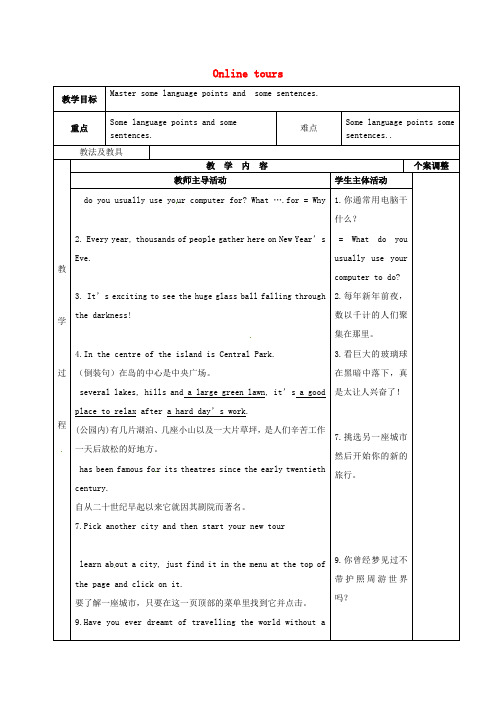
Online tours教学目标Master some language points and some sentences.重点Some language points and somesentences.难点Some language points somesentences..教法及教具教学过程教学内容个案调整教师主导活动学生主体活动do you usually use yo ur computer for? What ….for = Why2. Every year, thousands of people gather here on New Year’sEve.3. It’s exciting to see the huge glass ball falling throughthe darkness!4.In the centre of the island is Central Park.(倒装句)在岛的中心是中央广场。
several lakes, hills and a large green lawn, it’s a goodplace to relax after a hard day’s work.(公园内)有几片湖泊、几座小山以及一大片草坪,是人们辛苦工作一天后放松的好地方。
has been famous fo r its theatres since the early twentiethcentury.自从二十世纪早起以来它就因其剧院而著名。
7.Pick another city and then start your new tourlearn ab out a city, just find it in the menu at the top ofthe page and click on it.要了解一座城市,只要在这一页顶部的菜单里找到它并点击。
9.Have you ever dreamt of travelling the world without a1.你通常用电脑干什么?= What do youusually use yourcomputer to do?2.每年新年前夜,数以千计的人们聚集在那里。
牛津译林版英语八下Unit 3《Online tours》(Task)教学设计

牛津译林版英语八下Unit 3《Online tours》(Task)教学设计一. 教材分析牛津译林版英语八下Unit 3《Online tours》主要介绍了一种新兴的旅游方式——在线旅游。
通过学习本单元,学生能够了解在线旅游的相关词汇和表达方式,运用一般现在时介绍在线旅游的好处,并能够运用所学知识进行简单的对话交流。
本单元的主题贴近学生的生活,有利于激发学生的学习兴趣,提高学生的语言运用能力。
二. 学情分析八年级的学生已经掌握了基本的英语语法知识,具有一般现在时的基本运用能力。
学生的词汇量逐渐扩大,对日常生活中的一般事物能够进行简单的描述。
但部分学生对电脑操作还不够熟悉,需要老师在课堂上给予一定的引导和帮助。
三. 教学目标1.知识目标:–掌握与在线旅游相关的词汇和表达方式。
–学会运用一般现在时介绍在线旅游的好处。
–能够运用所学知识进行简单的对话交流。
2.能力目标:–提高学生的语言运用能力,使他们在实际生活中能够运用英语进行交流。
–培养学生的合作意识和团队精神。
3.情感目标:–激发学生对在线旅游的兴趣,引导学生正确使用网络资源。
–培养学生积极向上的生活态度,增强他们对旅游的热情。
四. 教学重难点1.教学重点:–掌握与在线旅游相关的词汇和表达方式。
–学会运用一般现在时介绍在线旅游的好处。
2.教学难点:–运用所学知识进行简单的对话交流。
–正确使用网络资源,提高学生的语言运用能力。
五. 教学方法1.任务型教学法:通过完成具体的任务,让学生在实践中掌握知识,提高能力。
2.情境教学法:创设真实的旅游情境,让学生在具体的情境中学习英语,提高语言运用能力。
3.合作学习法:引导学生进行小组讨论和合作,培养团队精神和沟通能力。
六. 教学准备1.准备相关的在线旅游资料,如图片、视频等。
2.准备在线旅游的相关词汇和表达方式,以便课堂上进行讲解和操练。
3.准备教学PPT,以便课堂上进行展示和讲解。
七. 教学过程1.导入(5分钟)–利用图片或视频引入在线旅游的主题,激发学生的兴趣。
2017牛津译林版八年级下册Unit3Onlinetoursword导学案
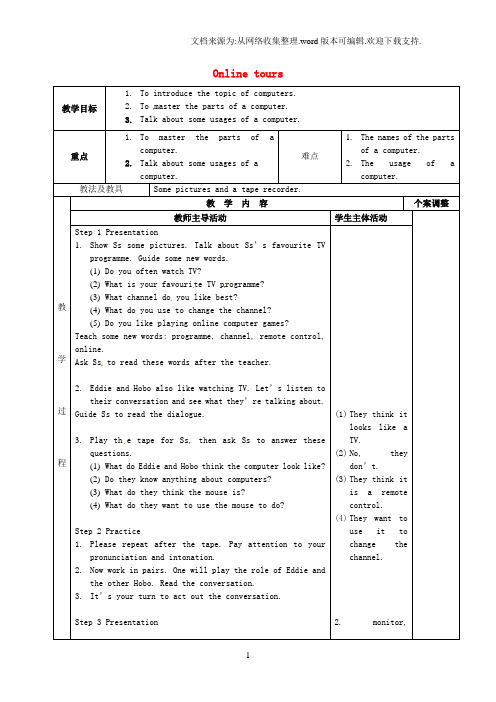
Online tours教学目标1.To introduce the topic of computers.2.To master the parts of a computer.3.Talk about some usages of a computer.重点1.To master the parts of acomputer.2.Talk about some usages of acomputer.难点1.The names of the partsof a computer.2.The usage of acomputer.教法及教具Some pictures and a tape recorder.教学过程教学内容个案调整教师主导活动学生主体活动Step 1 Presentation1.Show Ss some pictures. Talk about Ss’s favourite TVprogramme. Guide some new words.(1)Do you often watch TV?(2)What is your favouri te TV programme?(3)What channel do you like best?(4)What do you use to change the channel?(5)Do you like playing online computer games?Teach some new words: programme, channel, remote control,online.Ask Ss to read these words after the teacher.2.Eddie and Hobo also like watching TV. Let’s listen totheir conversation and see what they’re talking about.Guide Ss to read the dialogue.3.Play th e tape for Ss, then ask Ss to answer thesequestions.(1)What do Eddie and Hobo think the computer look like?(2)Do they know anything about computers?(3)What do they think the mouse is?(4)What do they want to use the mouse to do?Step 2 Practice1.Please repeat after the tape. Pay attention to yourpronunciation and intonation.2.Now work in pairs. One will play the role of Eddie andthe other Hobo. Read the conversation.3.It’s your turn to act out the conversation.Step 3 Presentation(1)They think itlooks like aTV.(2)No, theydon’t.(3)They think itis a remotecontrol.(4)They want touse it tochange thechannel.2. monitor,1.Simon’s cousin, Annie, wants to learn about thedifferent parts of a computer. Please tell her the names of the different parts. Turn to page 35 and write the correct answers in the boxes in Part A.2.Add some other names of a computer.puters are useful in our daily lives and they havechanged t he world.What do you usually use your computer for? How often do you use your computer for this?Write these words on the blackboard: do word processing, search for information, send and receive emails…Step 4 Practice1.Simon is good at computers. Now Daniel is asking himquestions. Listen to the tape and answer the questions.(1)What does Simon use his computer for?(2)How often does he use his computer to do this?2.Make a similar dialogue in pairs. They can use the ideasin the box.Step 5 ActivityWork in groups of four. One of the group members should tell us what your partners use computers for and how often they use computers. Then you should give your opinion ab out using computers properly.Some of you can also do a survey on what your parents use computers for and how often they use comp uters.Step 6 Home work1.Review this lesson.Preview Read ing part. CD-ROM drive, hard disk, flash drive/USB drive, memory, CPU, modem, speakeruse sth1 to do sth2For example:I don’t think we should s pend much time on computers in our spare time. We should spend more time with our families.板书设计 Unit 3 Online toursComic strip and welcome to the unitdo word processing search for information send and receive emails chat with sb.教学札记。
2017牛津译林版八年级下册Unit3Onlinetours5
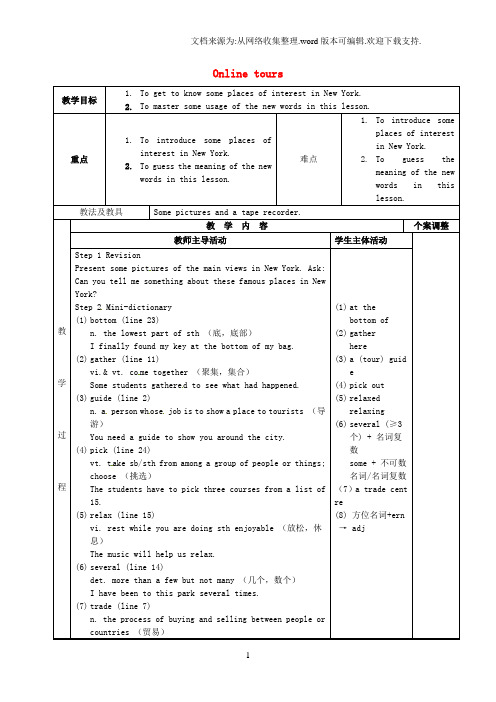
Online tours教学目标1.To get to know some places of interest in New York.2.To master some usage of the new words in this lesson.重点1.To introduce some places ofinterest in New York.2.To guess the meaning of the newwords in this lesson.难点1.To introduce someplaces of interestin New York.2.To guess themeaning of the newwords in thislesson.教法及教具Some pictures and a tape recorder.教学过程教学内容个案调整教师主导活动学生主体活动Step 1 RevisionPresent some pict ures of the main views in New York. Ask:Can you tell me something about these famous places in NewYork?Step 2 Mini-dictionary(1)bottom (line 23)n. the lowest part of sth (底,底部)I finally found my key at the bottom of my bag.(2)gather (line 11)vi.& vt. co me together (聚集,集合)Some students gathere d to see what had happened.(3)guide (line 2)n. a person wh ose job is to show a place to tourists (导游)You need a guide to show you around the city.(4)pick (line 24)vt. t ake sb/sth from among a group of people or things;choose (挑选)The students have to pick three courses from a list of15.(5)relax (line 15)vi. rest while you are doing sth enjoyable (放松,休息)The music will help us relax.(6)several (line 14)det. more than a few but not many (几个,数个)I have been to this park several times.(7)trade (line 7)n. the process of buying and selling between people orcountries (贸易)(1)at thebottom of(2)gatherhere(3)a (tour) guide(4)pick out(5)relaxedrelaxing(6)several (≥3个) + 名词复数some + 不可数名词/名词复数(7)a trade centre(8) 方位名词+ern→ adjThese countries have got lots of money from international trade.(8)southern (line 8)adj. of the south part of the world or a region (南方的)She lives in the southern part of the city.Step 3 Practice1.Ask Ss to read this article together for twice. And tryto remember the main words.nguage points.Try to remember the important language points in this Reading Part.3.补充练习:选择方框内的短语,并用其正确的形式填空。
牛津译林版八年级下册Unit3Onlinetours【全国一等奖】
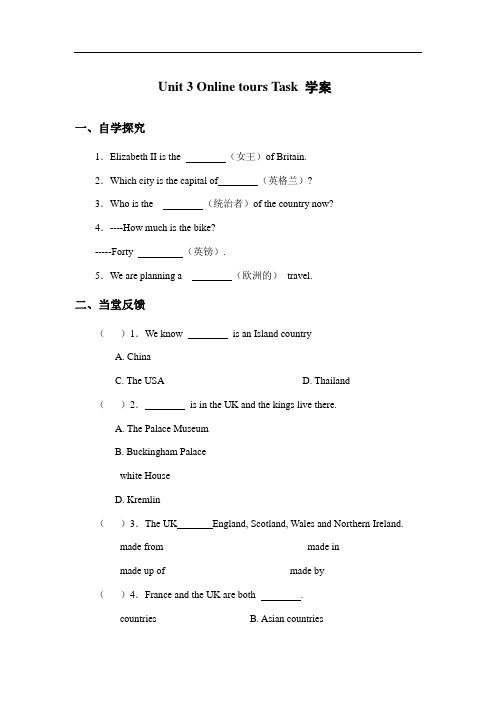
Unit 3 Online tours Task 学案一、自学探究1.Elizabeth II is the (女王)of Britain.2.Which city is the capital of (英格兰)?3.Who is the (统治者)of the country now?4.----How much is the bike?-----Forty (英镑).5.We are planning a (欧洲的)travel.二、当堂反馈()1.We know is an Island countryA. ChinaC. The USAD. Thailand()2.is in the UK and the kings live there.A. The Palace MuseumB. Buckingham Palacewhite HouseD. Kremlin()3.The UK England, Scotland, Wales and Northern Ireland.made from made inmade up of made by()4.France and the UK are both .countries B. Asian countriescountries countries()5.---Do the people in the USA use RMB?-----No,they use ,not RMB.三、拓展延伸(一)任务型阅读China has decided to take action to stop the use of free plastic bags since June 1st, 2022. Supermarkets, shops and outlets(经销点)in China are not allowed to offer plastic bags to customers and all carriers must be clearly marked with prices.The 'reason we give up offering quick and useful service to customers is that the plastic bags have caused serious pollution and waste of energy as well. People in the country use up to 3 billion plastic bags a day and the country has to refine 5 million tons of crude oil(原油)every year to make plastics used for packaging , according to a report on the website of China Trade News.Every year , people use too many plastic bags and at be same time we fail to deal with them in a right way, wasting valuable oil and littering the country , the State Council said in a notice posted on the central government website (gov. cn). So the government encourages people to return to carrying cloth(布)bags, using baskets for their vegetables.(二)缺词填空Computers are u__1__machines. They can help people a lot in their d__2__life. For example, they can help people to s__3__much time to do much work, and they can help people to w__4__out many problems they can not do easily. Our country asks everyone to learn to use computers i__5__the twenty-first century.Today more and more families o__6__computers. Parents buy computers for their children. They hope computers can help them improve their s__7__in school. Yet, many of their children use computers to play games, to w__8__vidoe or to sing. Computers cannot help the children to study b__9__make them fall behind. So computers are locked b__10__parents.。
- 1、下载文档前请自行甄别文档内容的完整性,平台不提供额外的编辑、内容补充、找答案等附加服务。
- 2、"仅部分预览"的文档,不可在线预览部分如存在完整性等问题,可反馈申请退款(可完整预览的文档不适用该条件!)。
- 3、如文档侵犯您的权益,请联系客服反馈,我们会尽快为您处理(人工客服工作时间:9:00-18:30)。
2017牛津译林版初中英语八年级英语下第1课时Comic strip & Welcome to the unit预习目标1.根据单词表,预习课本第34~35页的单词,能根据音标正确拼读这些单词。
2.听课本第34页Comic strip部分的录音,能正确地模仿录音中的语音、语调。
3.找出课本第34~35页新出现的短语和重点句型,查一查它们的意思。
预学热身◆通过预习,了解本课时的单词、短语和句型(英汉互译)。
1.online adj._______2.channel n. _______3. keyboard n._______4.mouse n. _______5._______n.节目;计划,方案6._______ n.机件;单位7._______n.显示器,屏幕8._______ vt.收到,接到9.remote control 10._______看起来像……11._______发送和接收邮件12._______搜索信息13. What do you usually use your computer for? ___________________________________14. I usually use it to search for information.___________________________________◆自主探究,请带着下面这些问题阅读教材。
1. Do you think Eddie and Hobo know well about computers?2. What do Eddie and Hobo think the computer looks like?3. Do you know what "the remote control" really is?教材导读1. It looks like a TV.它看起来像一台电视机。
探究点:“看起来像……”用_______表示。
[指点迷津] look在句中是系动词,意为“看起来”,后面常跟形容词作表语。
You look tired.你看上去累了。
(1) look like意为“看起来像……”,其中like是介词,后面常跟名词。
句子结构为:A looks like B,表示“A看起来像B”,谓语动词look的形式视主语的单复数形式而定。
Lucy looks like her mother.露西看起来像她的母亲。
(2) look the same意为“看起来一样”,后面不跟宾语。
句子结构为:A andB look the same,表示“A和B看起来一样”,谓语动词look用复数形式。
Lucy and Lily look the same.露西和莉莉看上去长得一样。
①你弟弟看上去长得像你父亲吗?_______ your younger brother_______ _______ _______ _______?②汤姆和蒂姆长得像吗?_______ Tom and Tim_______ _______ _______?2.What do you usually use your computer for?你通常用电脑干什么?探究点:“What…for?”是什么意思?[指点迷津] “What…for?”的意思是“为什么?”,相当于why。
What do you buy the book for? 你买这本书干什么?( )- _______ did you come here for? -To see my son.A. Why'B. WhatC. WhereD. How3.I usually use it to search for information。
我通常用它搜索信息。
[指点迷津] 探究点:search可用作_______词和_______词。
(1) search用作及物动词,后跟“人”时,意为“搜身”;后跟地点名词时,意为“对某地进行搜查”。
也可在宾语后加for短语,表示搜查的具体目标。
The enemy searched the mountain for the Red Army, but they failed.敌人在山上搜寻红军,但没找到。
(2) search for意为“寻找”,可视为是search…for的省略式,此时search为不及物动词。
She searched for her lost cat everywhere,but she failed.她到处寻找走失的猫,但没找到。
( )-Why did the police_______ the room? -Sorry,I don't know either.A. searchB. search forC. lookD. look in4.How often do you use your computer for this?你多久用你的电脑搜索一次信息?探究点:how often的意思是什么?对什么时间状语进行提问?[指点迷津] how often意为“多久一次”,表示频率,用来对usually,every day,twice a day 等频度副词或状语进行提问。
How often do you play football? 你多长时间踢一次足球?Every Wednesday afternoon.每周三下午。
[辨析] how long,how often,how soon与how far(1) how long主要有以下两个意思:①表示多长时间,主要用来对一段时间(如three days,four weeks等)进行提问。
- How long did he stay here? 他在这儿呆了多久?About two weeks,大约两个星期。
②表示某东西有多长。
- How long is the river? 这条河有多长?- About 500 km.大约500千米。
(2) how often指每隔多久,主要用来对频度副词或状语(如once a week,three times a month 等)进行提问。
-How often does he come here? 他(每隔)多久来一次?- Once a month.每月一次。
(3) how soon指再过多久,主要用来对表示将来的一段时间f如in an hour.in two weeks等)进行提问。
-How soon will he come back? 他要多久才回来?-In an hour.一小时以后。
(4) how far表示(距离)多远。
- How far is it from here to the zoo? 动物园离这儿多远?-It's 6 kilometres.大约6千米。
( ) (2013.益阳)- _______ does your father go to see your grandmother?-Once a month.A. How longB. How soonC. How often热身练习A.根据中文提示写出单词。
1.What is the_______(鼠标)used for?2. Now many young people like to shop_______(在线的).3.What do you think of the computer _______(程序)?4.I_______(收到)two presents yesterday.5. Today we are going to learn_______(单元)Two.B.用所给单词的适当形式填空。
1. I usually use my computer_______ (search) for information.2. The computer can be used for word_______ (process).3. My brother loves_______ (use) the computer to help him with his lessons.4. This film is_______ (bore).5. He_______ (find) a wallet in the street yesterday afternoon,C.单项选择。
( )1. It's too noisy. If you want to hear the TV news clearly, yo u’d better_______ the TV.A. turn onB. turn offC. turn upD. turn down( )2. - Excuse me, but I don't think you can smoke here.- I'm really sorry. I_______ that this is a non-smoking room.A. don't knowB. have no ideaC. had no ideaD. haven't know( )3. Her new glasses make her_______ an owl(猫头鹰).A. looks likeB. look likeC. look the sameD. looks the same( )4. Look! The light in the room_______.A. turn onB. turns onC. is turning onD. is turned on( )5. The film is very_______, and everyone feels with it.A. boring; boringB. bored; boredC. boring; boredD. bored; boring参考答案预学热身◆1.联网的,在线的2.频道3.键盘4.鼠标 5. programme 6. unit 7. screen8. receive 9.遥控器10. look like 11. send and receive emails 12. search for information13.你通常用电脑干什么?14.我通常用它搜索信息。
◆1. No, I don't. 2.They think it looks like a TV. 3.Yes. It is a mouse.教材导读1.①Does; look like your father ②Do; look the same 2.B 3.A 4.C热身练习A. 1. mouse 2. online 3. programme 4.received 5.UnitB. 1. to search 2. processing 3. using/to use 4.boring 5.foundC.1.C 2.C 3.B 4.D 5.C第2课时Reading预习目标1.根据单词表,预习课本第36~39页的单词,能根据音标正确拼读这些单词。
